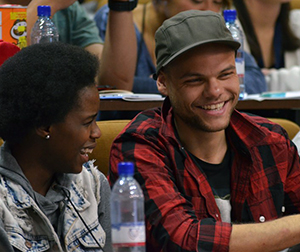Leadership and responsible citizenship: key themes at the Global Leadership Summit
 Photo Gallery
Photo Gallery
Leadership and responsible citizenship have been the main topics of discussion at the Global Leadership Summit which started on 5 July at the UFS Campus in Bloemfontein, and will continue until 17 July. More than 103 international delegates from various universities in Asia, the United States, and Europe, as well as 40 student delegates from the University of the Free State, are attending.
Kick-starting the summit talks was Prof Joel Samoff (Stanford University) who led discussions on transformation in institutions around the world. “Transformation is a constantly-changing interaction. It is not a single objective, but a process, “ he said. This was followed by a robust panel discussion with student leaders of the UFS and those from James Madison University, Mount Holyoke College, and Rutgers University, who described the journey of transformation at their various universities. “Young people are leading themselves in a different way, the context of the society we live in has changed,” said a UFS Student.
Keynote speaker, Zelda la Grange, gave an account of her experiences and the colourful journey of discovery of a “different” South Africa, working with President Nelson Mandela for 19 years, a journey that is the subject of her book, “Good Morning Mr Mandela “. Under the theme “Breathing the same air: A metaphor for human solidarity, Prof Pumla Gobodo-Madikizela, Senior Research Professor in Trauma, Forgiveness, and Reconciliation Studies led a talk with Candice Mama, the daughter of slain anti-apartheid activist, Gelnack Masilo Mama, one of the victims of the former hit squad commander, Eugene de Kok. Candice inspired the audience with her philosophy on life and letting go of trauma: “Forgiveness is a process, and one needs to forgive to be able to be liberated from anger and bitterness,” she said.
Dr Lis Lange, Vice Rector: Academic, UFS spoke of citizenship and freedom, focusing on the responsibility that humans have to create ethical, positive, and meaningful interaction in their daily lives and in their societies across the globe.
As part of the programme, delegates will visit the Qwaqwa Campus on 10 July 2015, where they will interact with the leadership of the campus, its staff, and students, and enjoy an arts and cultural experience of the Eastern Free State. The summit will end with a visit to various sites in Bloemfontein, where delegates will engage in community-based outreach activities in disadvantaged communities around the city.
UFS to host second Global Leadership Summit